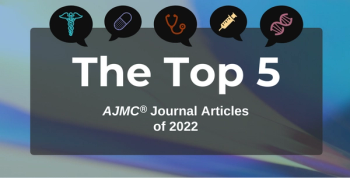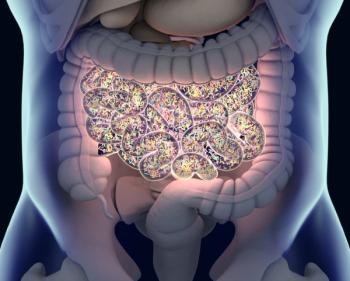
Coverage from the 64th Annual American Society of Hematology Meeting and Exposition, December 10-13, 2022, New Orleans, Louisiana.

Christina is the associate editorial director of The American Journal of Managed Care® (AJMC®) and Population Health, Equity & Outcomes, and joined AJMC in 2016. She oversees the publication of the print journals, from manuscript submission to publication, and works with the editors in chief and editorial boards to promote the journals.
She has a BS in public health from Rutgers University. You can connect with Christina on LinkedIn.

Coverage from the 64th Annual American Society of Hematology Meeting and Exposition, December 10-13, 2022, New Orleans, Louisiana.

Amazon’s announcement of a prescription subscription service that charges a flat monthly fee instead of offering discounts on each prescription fill represents the retail giant’s latest foray into the health care space.

During 2022, the FDA approved 2 chimeric antigen receptor (CAR) T-cell therapies for use in second-line treatment, offering new treatment choices but raising the question: What options remain once a patient relapses after CAR T?

Access to and outcomes of chimeric antigen receptor (CAR) T-cell therapies may differ by characteristics such as race, ethnicity, gender, and geographic location among patients with cancer.

In 2022, the articles published in the peer-reviewed The American Journal of Managed Care® (AJMC®) explored care management interventions, savings from biosimilars, and much more.

Our current health care reimbursement system rewards procedures and undervalues the time spent talking with patients and learning their history, which speaks to the need for primary care redesign, according to Vineet Arora, MD, MAPP, dean for medical education at UChicago Medicine.

Individual clinicians can lead efforts to build trust in science and distribute accurate information, but medical schools also have an important role to play in training health care professionals to communicate with the public, according to Vineet Arora, MD, MAPP, dean for medical education at UChicago Medicine.

As dean for medical education at the University of Chicago, Vineet Arora, MD, MAPP, takes a longitudinal view of the training pathway with an eye toward equity in opportunity and system-level improvement of processes.

Vineet Arora, MD, MAPP, dean for medical education at UChicago Medicine, discusses the qualities that led her to nominate Ishani Ganguli, MD, MPH, to receive the Seema S. Sonnad Emerging Leader in Managed Care Research Award. The American Journal of Managed Care® presented the 2022 award to Dr Ganguli at the 2022 Patient-Centered Oncology Care® meeting.

The FDA’s approval of teclistamab for relapsed/refractory (R/R) multiple myeloma makes it the first bispecific T-cell engager antibody to enter the treatment landscape.

Several elements of the Inflation Reduction Act (IRA) align with CMS’ goals of promoting equity through health policy, explained A. Mark Fendrick, MD, co–editor in chief of The American Journal of Managed Care® and director of the V-BID Center at the University of Michigan.

The Inflation Reduction Act (IRA) temporarily extended Affordable Care Act premium subsidies and instituted an insulin co-pay cap for Medicare beneficiaries, but bipartisan agreement is needed to make these changes permanent and more broadly applicable, explained A. Mark Fendrick, MD.

It's hard to predict whether the Medicare drug price negotiation provision in the Inflation Reduction Act (IRA) could lead to higher or lower prices in the commercial market, said A. Mark Fendrick, MD, co–editor in chief of The American Journal of Managed Care® and director of the V-BID Center at the University of Michigan.

Most implementations of value-based insurance design (VBID) in commercial markets involve prescription drugs, but some plans are beginning to incorporate cost-sharing offsets, said A. Mark Fendrick, MD, co–editor in chief of The American Journal of Managed Care® and director of the Center for Value-Based Insurance Design at the University of Michigan.

The Inflation Reduction Act (IRA) contains provisions allowing Medicare to negotiate net prices for prescription drugs, but it remains to be seen whether this will translate into savings for beneficiaries, explained A. Mark Fendrick, MD, co–editor in chief of The American Journal of Managed Care® and director of the V-BID Center at the University of Michigan.

A search of the peer-reviewed literature turned up inconsistent findings on the effectiveness of corticosteroid irrigation for the treatment of chronic rhinosinusitis (CRS) with nasal polyps.

Congress should build on the value-based insurance design (VBID) elements included in the Inflation Reduction Act to further alleviate the burden of health care costs on Americans, said A. Mark Fendrick, MD, co–editor in chief of The American Journal of Managed Care® and director of the V-BID Center at the University of Michigan.

Elements inspired by the principles of value-based insurance design (VBID) were incorporated into the recently signed Inflation Reduction Act, which could help reduce costs of care for patients, according to A. Mark Fendrick, MD, co–editor in chief of The American Journal of Managed Care® and director of the V-BID Center at the University of Michigan.

Despite some differences in the frequency of dermoscopic features between basal cell carcinoma (BCC) and benign skin tumors, dermoscopy alone is not sufficient for a reliable diagnosis, according to a recent study.

A primary analysis of the phase 2 ROSEWOOD trial finds that a combination of zanubrutinib and obinutuzumab is superior to obinutuzumab alone in relapsed/refractory follicular lymphoma (FL). Results were presented at the 2022 European Hematology Association Congress.

The late-breaking oral session at the 2022 European Hematology Association (EHA) Congress allowed investigators to present recently emerging data from abstracts submitted after the deadline, including outcomes from trials in chronic lymphocytic leukemia, multiple myeloma, and sickle cell disease.

During a session at the 2022 European Hematology Association Congress, speakers discussed how artificial intelligence (AI) can help advance the principles of ethical medicine—but also how new technologies are being used to undermine the integrity of scientific research.

Abstracts presented at the 2022 European Hematology Association Congress demonstrate superior health-related quality of life (HRQOL) outcomes among patients with chronic lymphocytic leukemia (CLL) and small lymphocytic leukemia (SLL) taking zanubrutinib.

In abstracts featured at the 2022 European Hematology Association Congress, investigators detailed long-term results of the ASPEN phase 3 trial and an expanded access study of zanubrutinib in patients with Waldenström macroglobulinemia (WM).

An education session at the 2022 European Hematology Association Congress featured updates on using genetic and immune characteristics to select the optimal treatment pathway in chronic lymphocytic leukemia (CLL).

The 2022 European Hematology Association (EHA) Congress will be the group’s first hybrid meeting, in which investigators will convene both virtually and in Vienna, Austria, from June 9-12, 2022, to present cutting-edge findings in the realm of oncology and hematology.

Abstracts presented at Digestive Disease Week 2022 showed that RBX2660, an investigational microbiota-based drug, was more likely to reduce the recurrence of Clostridioides difficile infection (CDI) compared with placebo.

During a State-of-the-Art Lecture at Digestive Disease Week 2022, Jessica L. Mellinger, MD, MSc, explained how the COVID-19 pandemic has driven increases in rates of alcohol use and associated liver disease, as well as what can be done at the clinic, societal, and policy levels to address these trends.

Evidence shows that weight loss achieved through bariatric and endoscopic surgery can help treat and reverse nonalcoholic fatty liver disease (NAFLD), but optimal procedure selection and timing vary by patient factors, according to speakers at Digestive Disease Week 2022.

A pair of posters presented at Digestive Disease Week 2022 showed the efficacy of an investigational biotherapeutic in preventing Clostridioides difficile infection recurrence and restoring the microbiome.

259 Prospect Plains Rd, Bldg H
Cranbury, NJ 08512
© 2025 MJH Life Sciences®
All rights reserved.
